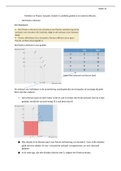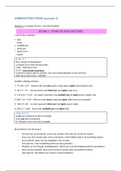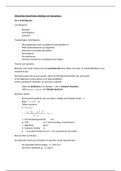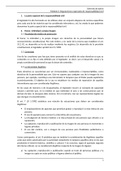CONTRACT LAW EXAM NOTES
- Contracts fulfil more than a strictly commercial purpose in these chains; they also serve a regulatory purpose as they help to control risks the
environment, consumers, and workers are confronted with in global value chains. -
CORE THEMES:
1. the economic concept of global value chains and its relationship with (private) law
2. how major multinational companies (such as producers, retailers and brands) strategically use commercial contracts and contract law to organize and
regulate their value chains
3. which theories of liability, either sounding in contract or tort law, might enable consumers, workers and local communities to recover losses as
emerged in global production
4. how courts and legislators have been concerned study with false claims by multinationals in terms of their ‘corporate social responsibility’, i.e. on
their protection of the environmental and of workers in global value chains.
Table of Contents
Week 1 – Introduction to Contract and Regulation ............................................................................................................................................................. 2
Week 2 – Global Value Chains and Contract law ................................................................................................................................................................ 6
Week 3 – Monitoring compliance in GVC´s ........................................................................................................................................................................13
Sources .................................................................................................................................................................................... Error! Bookmark not defined.
, Week 1 – Introduction to Contract and Regulation
GOALS
Understand the basic concept of DEFINTION:
regulation; (a) Creation of rules that set a standard and
(b) the monitoring compliance of rules and
(c) enforcement of the regulation (Rule-making)
monitoring enforcement
standard
(information (behavioral
(rule)
gathering) change)
à monitoring (information gathering) à as well as information from which we can go back to standard)à enforcement
(behavioral change))
Discuss the concept of regulation in - REGULATION IS A (external) PERSPECTIVE ON LAW: is law delivering on goals set – effectiveness of law?
relation to contract law; • How to manage effectiveness? à can be economic, victim based etc.
- Goals of contract law (because without goals we don’t know if contract law is fulfilling standard):
• Libertarian view: A) facilitating of market transactions and B) legal certainty
• Regulatory view: If rights and obligations between parties are fair and just à social welfare
- Collins (2004): contract law should not be seen as facilitative only (distributive justice – to optimize social welfare) à
e.g., unfair terms, implied terms à for steering and controlling markets or private ordering
, • Contract law as mechanism of governance
• Determining the scope of inquiry by reference to social practice rather than law
- Sunstein & Thaler (2003):
a) Libertarian paternalism: people should be “free to make their own choices”, HOWEVER, it is legitimate for the
state and private actors to intervene in order to steer the consumers decision to the option best for their
welfare à Bounded self-control
Contract law as regulation
- Establishes enforceable obligation between the participant of the contract (freedom to contract – pacta sunt
servanda)
- Carlill v carbolic smoke ball Co. [1893] 1 QB 256, CA à issue of meeting of minds on terms in advertisement
- Rules on
(a) who can contract (legal capacity, agency)
(b) what is contracted for and (interpretation, gap-filling)
(c) how contracts govern parties’ relationships (types: commercial/long-term; terms: “boiler parts”, “General Terms
and Conditions”) à e.g., Bangladesh Accord on Fire & Building safety (2021)
(d) what happens in case of non-compliance (remedies for breach)
- Contracts allow the chain ‘leaders’ to
(a) govern the chains and
(b) impose specific demands on their suppliers in terms of the quality of the materials or services sourced,
(c) in terms of the compliance with standards of environmental protection and labour rights
Contract as regulatory tools
- Seek to attain a certain goal à contracts as a means of regulation
, - Regulate obligations between parties /pacta sunt servanda (freedom of contract)
- Certain TERMS and TYPES of contracts
- Collins (2004): contract law as a governance mechanism for steering and controlling markets or private ordering
Contract law being regulated
- State intervention overseeing the power balance between contracting parties as well as resolving market failures
through adjusting or removing contract law rules and overcome information asymmetries
- Example: consumer protection law (regulating contract law for: information disclosure rules, unfair commercial
practices, unfair terms)
- WHY is state intervention needed?
a) Resolve power imbalance
b) Resolve market failures
- Collins (2004): rules of contract law are a regulatory mechanism AND are the subject of regulatory mechanisms
- Sunstein & Thaler (2003): infusion of economic theory by insights from psychology (Nudge) – bounded rationality/
bounded self-control à information paradigm is not enough to achieve that people choose what is in their best
interest
Understand and explain why there Economics:
are various regulatory instruments - Collins (2004): In the context of globalization of trade (the shifting from sectors to stages of production Baldwin, 2019),
that can be used to influence the states have the challenge to put in place regulations in order to govern commercial transactions to not be
behavior of persons and achieve disadvantaged in the transnational market operations (i.e., so that power imbalances and market failures can be
policy goals; including those based avoided) à markets objective is to be effective and generate wealth: due to the increasing privatization of the market
on behavioral law and economics the government needs to implement regulations to achieve that objective à e.g., contract law
- Contracts fulfil more than a strictly commercial purpose in these chains; they also serve a regulatory purpose as they help to control risks the
environment, consumers, and workers are confronted with in global value chains. -
CORE THEMES:
1. the economic concept of global value chains and its relationship with (private) law
2. how major multinational companies (such as producers, retailers and brands) strategically use commercial contracts and contract law to organize and
regulate their value chains
3. which theories of liability, either sounding in contract or tort law, might enable consumers, workers and local communities to recover losses as
emerged in global production
4. how courts and legislators have been concerned study with false claims by multinationals in terms of their ‘corporate social responsibility’, i.e. on
their protection of the environmental and of workers in global value chains.
Table of Contents
Week 1 – Introduction to Contract and Regulation ............................................................................................................................................................. 2
Week 2 – Global Value Chains and Contract law ................................................................................................................................................................ 6
Week 3 – Monitoring compliance in GVC´s ........................................................................................................................................................................13
Sources .................................................................................................................................................................................... Error! Bookmark not defined.
, Week 1 – Introduction to Contract and Regulation
GOALS
Understand the basic concept of DEFINTION:
regulation; (a) Creation of rules that set a standard and
(b) the monitoring compliance of rules and
(c) enforcement of the regulation (Rule-making)
monitoring enforcement
standard
(information (behavioral
(rule)
gathering) change)
à monitoring (information gathering) à as well as information from which we can go back to standard)à enforcement
(behavioral change))
Discuss the concept of regulation in - REGULATION IS A (external) PERSPECTIVE ON LAW: is law delivering on goals set – effectiveness of law?
relation to contract law; • How to manage effectiveness? à can be economic, victim based etc.
- Goals of contract law (because without goals we don’t know if contract law is fulfilling standard):
• Libertarian view: A) facilitating of market transactions and B) legal certainty
• Regulatory view: If rights and obligations between parties are fair and just à social welfare
- Collins (2004): contract law should not be seen as facilitative only (distributive justice – to optimize social welfare) à
e.g., unfair terms, implied terms à for steering and controlling markets or private ordering
, • Contract law as mechanism of governance
• Determining the scope of inquiry by reference to social practice rather than law
- Sunstein & Thaler (2003):
a) Libertarian paternalism: people should be “free to make their own choices”, HOWEVER, it is legitimate for the
state and private actors to intervene in order to steer the consumers decision to the option best for their
welfare à Bounded self-control
Contract law as regulation
- Establishes enforceable obligation between the participant of the contract (freedom to contract – pacta sunt
servanda)
- Carlill v carbolic smoke ball Co. [1893] 1 QB 256, CA à issue of meeting of minds on terms in advertisement
- Rules on
(a) who can contract (legal capacity, agency)
(b) what is contracted for and (interpretation, gap-filling)
(c) how contracts govern parties’ relationships (types: commercial/long-term; terms: “boiler parts”, “General Terms
and Conditions”) à e.g., Bangladesh Accord on Fire & Building safety (2021)
(d) what happens in case of non-compliance (remedies for breach)
- Contracts allow the chain ‘leaders’ to
(a) govern the chains and
(b) impose specific demands on their suppliers in terms of the quality of the materials or services sourced,
(c) in terms of the compliance with standards of environmental protection and labour rights
Contract as regulatory tools
- Seek to attain a certain goal à contracts as a means of regulation
, - Regulate obligations between parties /pacta sunt servanda (freedom of contract)
- Certain TERMS and TYPES of contracts
- Collins (2004): contract law as a governance mechanism for steering and controlling markets or private ordering
Contract law being regulated
- State intervention overseeing the power balance between contracting parties as well as resolving market failures
through adjusting or removing contract law rules and overcome information asymmetries
- Example: consumer protection law (regulating contract law for: information disclosure rules, unfair commercial
practices, unfair terms)
- WHY is state intervention needed?
a) Resolve power imbalance
b) Resolve market failures
- Collins (2004): rules of contract law are a regulatory mechanism AND are the subject of regulatory mechanisms
- Sunstein & Thaler (2003): infusion of economic theory by insights from psychology (Nudge) – bounded rationality/
bounded self-control à information paradigm is not enough to achieve that people choose what is in their best
interest
Understand and explain why there Economics:
are various regulatory instruments - Collins (2004): In the context of globalization of trade (the shifting from sectors to stages of production Baldwin, 2019),
that can be used to influence the states have the challenge to put in place regulations in order to govern commercial transactions to not be
behavior of persons and achieve disadvantaged in the transnational market operations (i.e., so that power imbalances and market failures can be
policy goals; including those based avoided) à markets objective is to be effective and generate wealth: due to the increasing privatization of the market
on behavioral law and economics the government needs to implement regulations to achieve that objective à e.g., contract law









